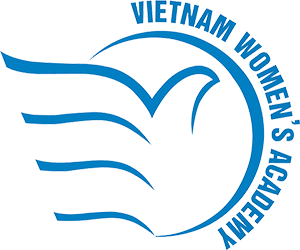
Inheriting the development of more than 50 years of the Central Women Cadre Training School, VWA organizes: (1) Training staff of Women's Unions (WU) at all levels, female officials for the political system; (2) Participating in training highly qualified human resources (undergraduate, postgraduate) with high quality to meet social needs; (3) Researching from theories and summarizing from practices to advise the Executive Committee and the Presidium of Vietnam Women's Union (VWU) in directing and organizing the work of the Union and the Women's movements, proposing to the Party and State issues related to women, women's work, gender equality, and researching for building the training program of VWA.
History of formation and development
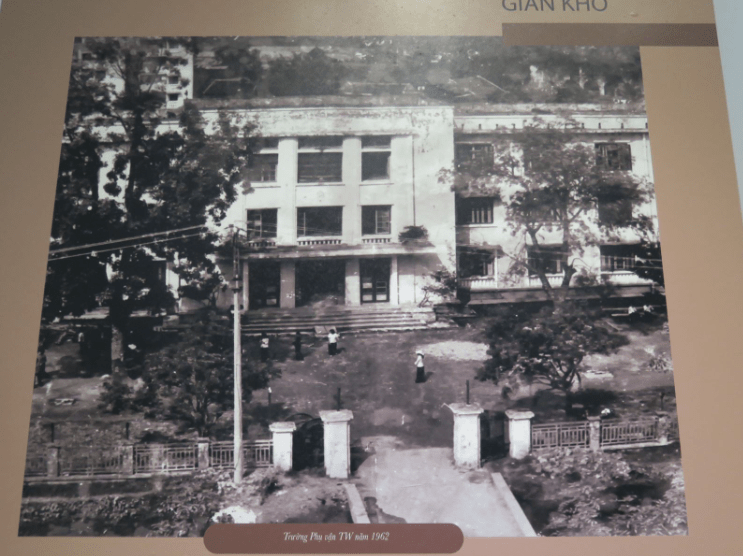 Period 1960 - 1964
Period 1960 - 1964
On March 8, 1960, the Standing Committee of the Central VWU issued a Resolution to establish the Central School of Women’s Agitation & Propaganda, with the function of training and fostering to improve the qualifications of the officials of VWU at all levels, as well as staff in the work of Women’s Agitation & Propaganda in all sectors. The School's mission is to improve the theoretical level and ideological awareness of students about the socialist revolution, and to foster professional skills in the work of VWU to promptly meet the central tasks of the Party and of the Women’s movements.
Immediately after the establishment resolution was issued, the organization and staff of the School were also established with more than 10 people, under the direct command of the Party, the Youth Union and the Standing Committee of VWU. The School's Board of Management, officials, and employees are mobilized from the Boards of Central VWU and localities. While there was no location yet, the School's Board of Management rented the land of Central Agricultural Vocational School (in Van Dien town, Thanh Tri, Hanoi) as a location to organize the first course opening on May 20th, 1960 with a total of 126 students. By the end of 1961, the School had opened 2 courses.
In 1962, the School was allowed by the State to build a location in Lang Thuong ward, Dong Da district, Hanoi. After completing the construction of facilities, the School began to consolidate the Organizational apparatus, including: Board of Management, Content Department, and Service Department. From a small Party group, the School established a Party cell under the Party Committee of the Central VWU and established a trade union group under the Trade Union of the Central VWU.
In April 1962, the School opened the first course of the long-term program with the content of political theory and the work of Women’s Agitation & Propaganda.
In 1964, to meet the requirements and tasks of the Revolutionary cause and the Women's movements, the Standing Committee of Central VWU decided to change the name of the Central School of Women’s Agitation & Propaganda to Central Women Cadre Training School with the mission of training and fostering a team of officials responsible for VWU's work at all levels; the operation and management of the School during this period was in charge by two leaders of VWU. The School has established a Personnel Organization Department, an Administration Department, a Cultural Supplement Branch and a Content Department. During this period, there was a significant change, the Content Department established Faculties: Philosophy, Political economy, Party history, Policy, Economic Management, and Women’s Agitation & Propaganda. This is the premise for the establishment of specialized faculties later on.
The School's management and teaching staff during this period were very young, most were around the age of 30, the majority had secondary and high School education, intermediate level of political theory, some with advanced level; all officials and employees are trained in primary political theory and cultural enrichment.
From 1960-1964, the School organized 4 training courses with a total of 600 students, including 301 long-term students.
Period 1965-1975
It was a period of consolidation and development of the School. In 1965, the School's apparatus was consolidated and perfected. The Board of Management includes 3 comrades (1 President and 2 Vice Presidents). The groups of Faculties (Policy group, Philosophy group, Economics group, Women’s Agitation & Propaganda group) and Departments (Administration, Library, and Cultural Enrichment Campus) are formed.
Also during this period, to meet the Revolutionary situation and the need to train southern cadres, Le Thi Rieng School was established (March 8th, 1969).
By 1971, the organizational apparatus was increasingly improved to implement the intermediate theoretical training program. From the Departments, the School has formed the following Faculties: Philosophy, Political Economy & Economic management, Science Socialism, Party History & Party Building, Work of Women’s Agitation & Propaganda. The School's teaching staff is increasingly improving in quality. The School is supplemented and strengthened with staff from political theory schools from the Ministry of Education and the Central Propaganda Department.
During this time, the US sabotage war was fierce, the School had to organize evacuations to preserve its forces. Officials and employees had overcome difficulties and dangers to conduct training right at the School, promptly meeting the needs of training and fostering local officials. The School has organized 2 training courses in Viet Bac and a refresher course in Hoa Binh.
In 1972, in addition to training domestic WU’s officials, the School organized training for 133 women officials of the Lao People's Democratic Republic. Many Lao students who attended training courses at the School later held key leadership positions in the Lao Women's movements from central to local levels.
Period 1975 – 1985
Facing the Revolutionary requirements and tasks in the new period, it is necessary to build a team of capable and qualified staff. The organizational structure, the team of teachers and employees of the School are also constantly being built, strengthened and developed. The School has established an additional Department of Organization - Education. The School's organizational apparatus includes the Board of Management, 5 specialized Faculties (Philosophy, Political Economy & Economic management, Science Socialism, Party History & Party Building, and Work of Women’s Agitation & Propaganda), and 2 functional Departments (Administration - Management, and Organization - Education). The total number of teachers and staff at the School is up to 60 people.
The staff of Le Thi Rieng School has also been consolidated and strengthened. From the 13 comrades returning from the war zone, the School recruited more service workers and teachers, bringing the total number of teachers at the School to 45 people. The School's organizational structure includes the Board of Management and 2 Departments: Academic Affairs and Personnel Organization.
In 1984, Le Thi Rieng School was renamed into School for Women's Officials, Division II, with an organizational structure including the Board of Management and 2 Departments: Administrative Management and Personnel Organization, with 29 officials and employees.
Period 1986 - 1990
During this period, the School's organizational structure was streamlined, in a more positive and effective direction. Based on the functions and tasks of training activities, the School has consolidated and merged, renaming 5 specialized Faculties into 2 Faculties: Faculty of Marxist-Leninist Theory and Faculty of Logistics, and has established 1 new room called Women's Empowerment - Service. The total number of staff and employees of the School during this period was only 40 people.
Compared to previous periods, during this period, the qualifications of the School's staff, lecturers, and workers have continuously improved. 100% of teachers graduated from university, 50% are studying professional, graduate and doctoral programs, and almost 70% have level A and B in foreign languages.
Period 1990 – 1996
This is the period when the organizational structure and staff of the University gradually improved the quality of operations. The School's staff has been reduced in the direction of reducing officials and staff and strengthening the team of teachers and researchers. The total number of School staff by 1996 was only 28 people, of which administrators and teachers accounted for 60%.
During these years, the School's teachers and staff have also actively studied to improve their qualifications: 100% of teachers have university degrees, in which 9 comrades have 2 university degrees, 2 comrades have master's degrees, 8 comrades are graduate students and graduate students, and 2 comrades have high political qualifications.
During this period, the organizational apparatus and staff of the Central Women Cadre Training School II were also consolidated in a streamlined and efficient direction. The total number of staff is 21 comrades, of which the Board of Management includes 3 comrades, 9 lecturers, and 9 service staff.
Period 1996-2000
The School continues to strengthen its organizational structure to improve the operational capacity of its staff. The School has merged the two Departments of Administration - Management, and Organization - Education into the Administrative Organization Department. The organizational apparatus includes the Board of Management, Faculties, and Departments: Marxist - Leninist Theory, Women’s Agitation & Propaganda and Administrative Organization Department. The School’s staff qualifications have made significant progress: by 2000, there were 9 masters, 3 postgraduate staff and graduate students; 90% of lecturers have advanced degrees and bachelor's degrees in Politics.
To meet the requirements of innovation, the Central Women Cadre Training School II continues to strengthen its organizational and staff apparatus. The Political Theory Faculty, Logistics Faculty, the Business Group and the Administration - Management Department are established. By 2000, the School had 5 teachers with master's degrees, 1 postgraduate teacher and 40% of teachers with foreign language qualifications A, B, C.
Period 2000-2004
This is a period with many major changes in the School's organizational structure. In 2000, the Central Women Cadre Training School and the Central Women Cadre Training School II were merged to form the Central Women Cadre Training School.
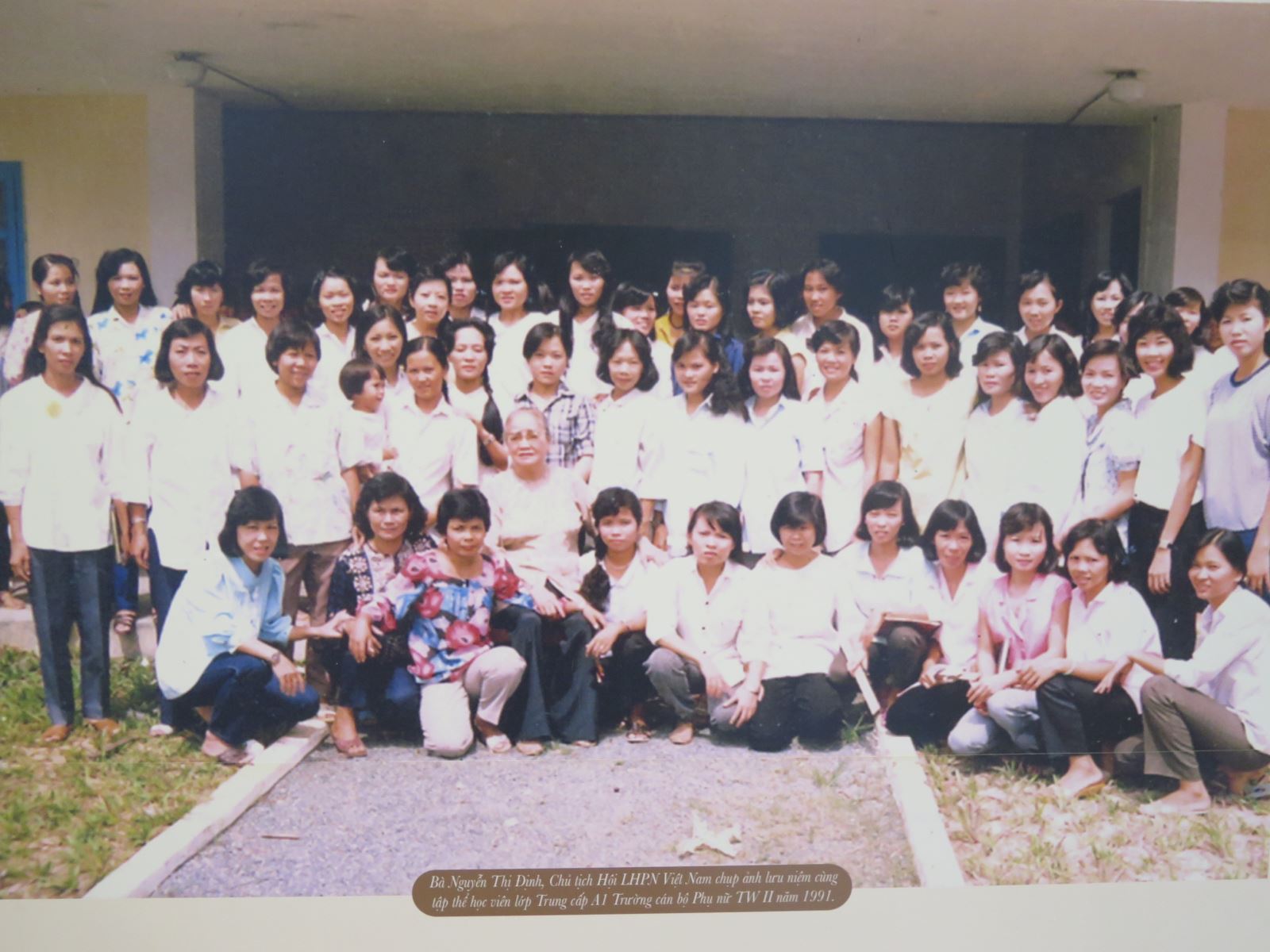
Since July 2002, implementing the Resolution of the 9th National Women's Congress, under the firsthand direction of the Presidium of Central VWU, the School has conducted research and developed a project to establish VWA. To bring training activities into order and professionally, the School has established a Training Department.
In order to prepare the conditions for establishing VWA and unifying training and research activities, in May 2004, the Central VWU decided to merge the Research Department of the Central VWU into the School and established the Women's Studies Center under VWA.
The organizational structure has been consolidated, including the Board of Management (including 1 President, 1 Vice President in charge of Administration and Management, 1 Vice President in charge of Research, and 1 Vice President in charge of the operations of the Campus) and 6 affiliated units: Marxist-Leninist Theory Faculty, Women’s Agitation & Propaganda Faculty; Administrative Organization Department; Training Department, Central Women Cadre Training School Campus and Women's Studies Center. The School also formed an Enterprise Department.
The total number of employees during this period is 73 people. The qualifications of the School's staff and lecturers have improved significantly compared to the previous period. The School has 2 PhDs; 16 Masters and 18 Bachelors.
Period 2005 - 2010
To prepare for the establishment of VWA, the organizational structure and staff of the School have undergone major improvements and changes:
In 2007, the name of Women’s Agitation & Propaganda Faculty was changed to Women's Affairs Faculty, and Marxist-Leninist Theory Faculty became Basic Sciences Faculty.
In 2008, Business Administration Faculty was established based on Enterprise Department.
In 2009, the Center of Training and Capacity Building for Women was established; another 3 functional Departments under the Women's Studies Center were established as well, namely Gender & Development Studies, Women's Movement Studies, and Family and Social Issues Studies.
The Campus in Ho Chi Minh City has the Departments of Administrative Organization and of Training, and Faculties of Basic Sciences and of Women's Work.
This is a period of outstanding development for the School in terms of quantity and quality of staff. The Board of Management was supplemented with a Vice President in charge of Training. The total number of permanent and contract staff of the School has increased to 85. The professional qualifications of School officials and teachers are increasingly improving. The School has 6 PhDs, 7 PhD students, 31 Masters, and 32 Bachelors...
On March 3rd, 2010, the Prime Minister issued Official Dispatch No. 380/TTg-KGVX approving the policy of establishing VWA on the basis of upgrading the Central Women Cadre Training School.
From 1960 to 2010, the staff, lecturers, and researchers of the University have constantly innovated, united, overcome all difficulties, strived to well realize the goals of training, research, and implementation, fulfilled the tasks assigned by the Presidium of VWU, and gradually met the requirements of training for VWU officials at all levels. On the occasion of the 50th anniversary of its founding (March 8th, 1960 - March 8th, 2010), the Central Women Cadre Training School has received the Second Class Independence Medal.
Period 2010 - 2020

On October 18th, 2012, the Prime Minister signed Decision No. 1558-TTg on the establishment of VWA on the basis of upgrading the Central Women Cadre Training School.
Workshop on the Development Orientation of VWA
On March 27th, 2013, the Ministry of Education and Training issued Decision No. 1103/QD-BGDDT allowing VWA to train university-level majors.
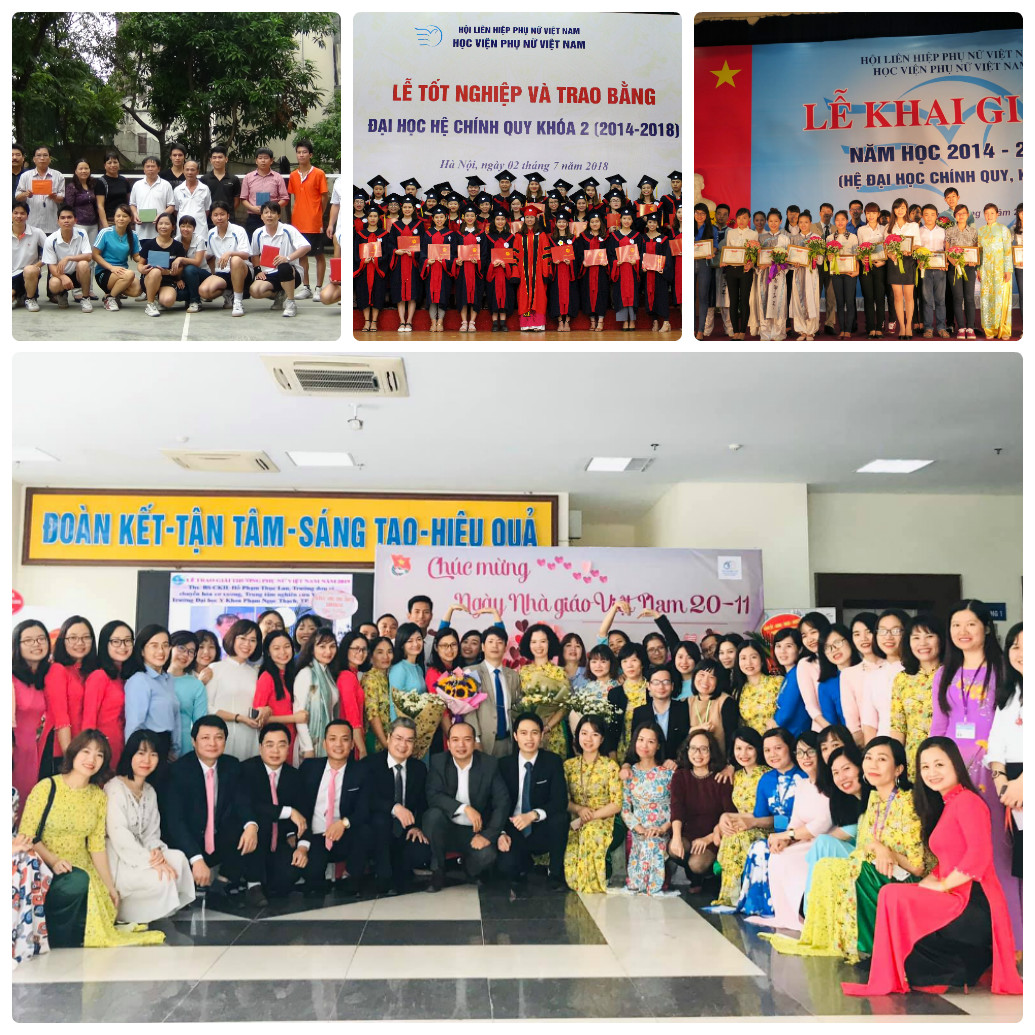
By July 2013, VWA had 3 Faculties: Social Work Faculty (formerly known as Women's Work Faculty), Business Administration Faculty, and Basic Sciences Faculty, Women's Studies Institute (formerly Women's Studies Center), 3 Centers: Center of Training and Capacity Building for Women (Cet-caw), Officials Training Center, Information Technology Center - Library, 3 Departments: Administrative Organization Department, Training Department, International Cooperation Department, and 1 VWA Campus in Ho Chi Minh City. The total number of officials and lecturers of VWA is 92 people; including 10 PhDs, 4 PhD students, 28 Masters, 50 Bachelors...
In 2019, VWA was licensed by the Ministry of Education and Training to train master's degrees in Business Administration and Social Work. Currently, VWA is continuing to enroll students for Master's degree training course 2.
In 2019, the International Organization named BVQA signed a Decision to grant a Management System certificate according to ISO 9001:2015 standards to VWA.
On March 8th, 2020, VWA will celebrate 60 years of the glorious tradition of its predecessor, the Central School of Women’s Agitation & Propaganda.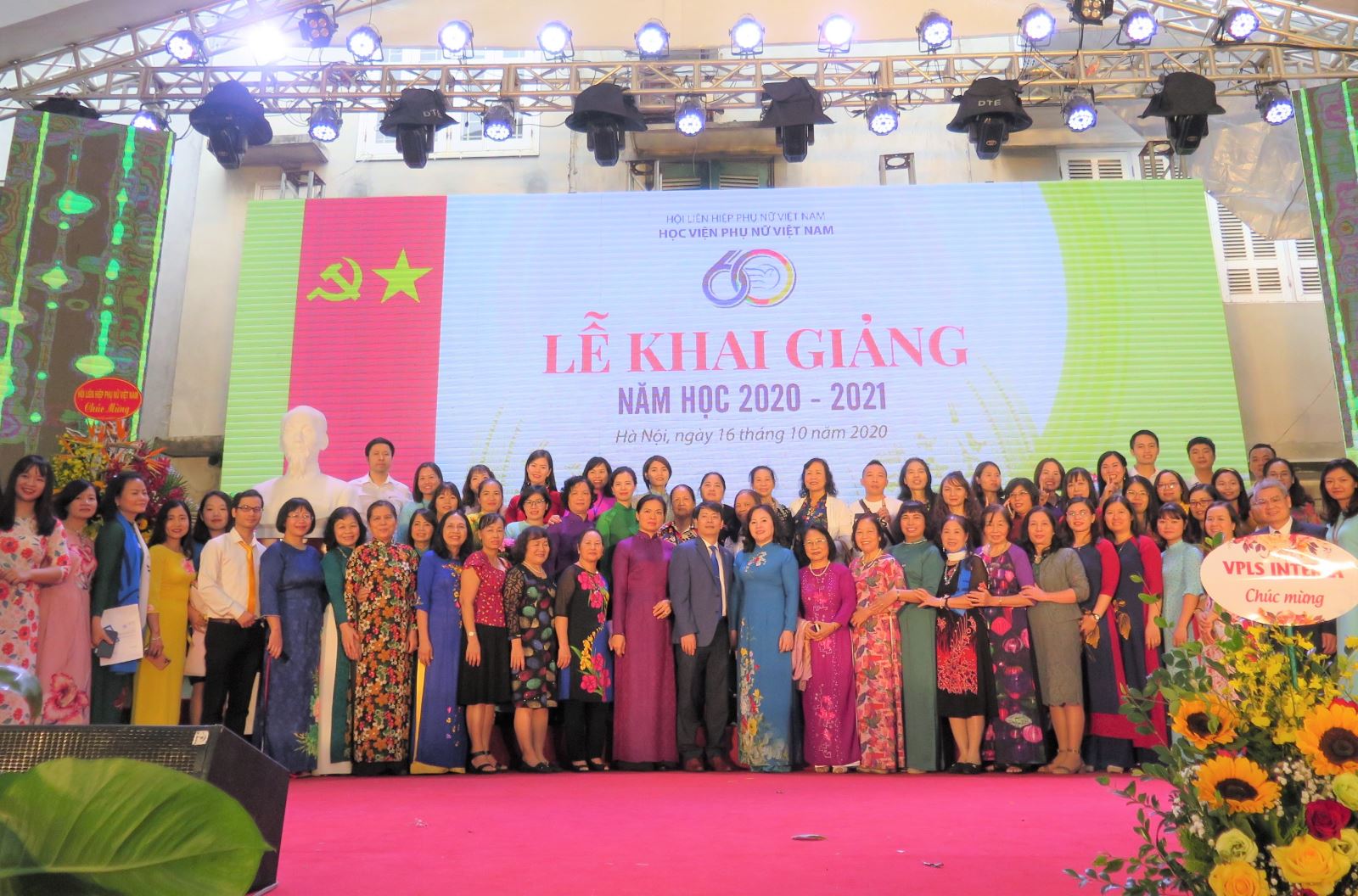
From 2020 onwards:
On November 20, 2021, the VWA's Board of Trustees issued Resolution No. 03/NQ-HDHV, which promulgates the regulations on the organization and operations of VWA. This resolution replaces Decision 479/DCT- HVPNVN of the Presidium of the VWU.
On December 1, 2021, VWA issued Decision No. 918/QD- HVPNVN on the establishment of the Legal Consultation Center in VWA.
Over the past years, VWA has gained many achievements in all fields of activity, specifically as follows:
- Training VWU's Officials: VWA plays a focal role in building and advising the Prime Minister for the approval of 2 projects on training VWU's officials at all levels during the 2013 - 2017 period (Project 1891) and the 2019 - 2025 period (Project 1893). Every year, VWA organizes trainings for more than 2,000 learners across the country. Also, VWA regularly organizes training for officials of Lao Women's Union and Cambodian Women's Union regarding Peace and Development. The training method has also changed, closely combining face-to-face training and e-learning with nearly 80 high-quality dynamic lectures built.
- Under-graduate and post-graduate academic programs: By 2023, VWA has successfully recruited and trained 11 full-time university student courses with a scale that has already reached the set goal (more than 5,000 students). Of these, 7 cohorts of students have graduated, with the employment rate reaching over 80%. VWA always grasps social needs to open appropriate majors. By 2023, VWA will train 10 Undergraduate, 3 Master's, and 2 Doctoral majors, including typical ones such as Gender & Development, Social Work,... All major's training programs have specific subjects related to gender and women.
The organization of training has been operated synchronously in the direction of promoting the active participation of students, evaluating teaching and learning according to the process of ensuring seriousness and objectivity. Expected learning outcomes and training programs of all majors are publicly announced, ensuring integration and competitiveness with domestic and regional schools. The database of learners participating in training programs and participating in subjects/modules is established, managed and monitored through training management software. Teaching and learning activities have had strong applications of information technology, with the implementation of online training simultaneously for full-time university students and graduate students, contributing to affirming VWA's capacity and rapid digital transformation in education.
- Science & Technology: VWA has carried out 01 independent scientific research project at the state level, many projects at the ministerial and the VWA levels, as well as implemented many basic surveys on a number of women's groups. The quality of scientific research of lecturers and researchers has been improved. A total of nearly 500 national and international scientific articles by lecturers and researchers have been published, including many articles of ISI and SCOPUS.
VWA has promoted the organization and implementation of student scientific research activities as well, so as to improve the overall quality of scientific research. After 7 academic years, the number of student projects accepted at the VWA level is nearly 100. Since 2018, VWA has operated the VWA Journal of Science, a scientific publication with an ISSN index, published periodically 4 issues per year. VWA Journal of Science is included in the list of scientific journals scored by the Interdisciplinary Council for Professorship regarding Philosophy, - Sociology - Politics, and Economy.
- International Cooperation: VWA has regular cooperative relationships with almost 50 foreign research & education facility and foreign organizations in many developed countries. Every year, VWA welcome many international experts from prestigious universities, research institutes and social organizations around the world to exchange, discuss and work for long term at VWA.
- Finance and Facilities: Vietnam Women's Academy is gradually investing in modern facilities, both for the headquarters in Hanoi and the campus facility in Ho Chi Minh City. VWA is also doing so in expanding the facility in Duong Xa commune and Kieu Ky commune, Gia Lam district, Hanoi, with an area of 3.6 hectares. Information technology infrastructure is also being invested, with more than 300 computers, including 5 labs serving the purposes of management, training and scientific research. VWA's main website (hvpnvn.edu.vn) operates effectively, contributing to its brand recognition, facilitating management, as well as its teaching, learning, scientific research and community service. Information Technology applications are deployed and built such as EduSoft training management, ILIB Library management, human resource management, ITest multiple choice exam, Eoffice internal information system, EduWeb training portal, LMS online training system,... VWA is also building and operating VWA Connect software and a system of software for managing and managing its general operations.
In addition to the annual state budget funding for regular and irregular expenses, VWA has been dynamic and active in recruiting students, exploiting assets, connecting with partners in training so as to increase revenues. Expenditure contents and norms have already been detailed and updated in the internal expenditure regulations. Every year, VWA do well in conducting internal audits and complying with the State's audits.
- Quality Assurance & Internal Procedures: Quality assurance and accreditation of educational institutions have been of concern to VWA since the early days of its establishment. VWA organized self-assessment twice in 2015 and 2018, and was acknowledged by the Ministry of Education and Training (MOET). In 2020, the Center for Educational Quality Accreditation under the Association of Vietnam Universities and Colleges organized a team of experts to independently evaluate and to issue Certificate of Quality Accreditation for higher education institutions according to new regulations of MOET. In 2023, VWA will have received a Certificate of Quality Accreditation for 3 training programs: Social Work, Business Administration, and Law, issued by Thang Long Education Quality Accreditation Center.
- Activities to improve the organization's capacity: VWA's organizational structure and personnel have developed strongly. The total number of affiliated units is 18, including 6 faculties (Basic Sciences, Social Work, Business Administration, Law, Gender & Development, Multimedia Communication); 2 institutes (Women's Studies Institute, Information Technology Institute), 4 centers (Officials Training Center, Center of Training and Capacity Building for Women – CetCaw, Microfinance Training Center, Legal Consultation Center), and 6 departments (Administrative Organization, Training, Student Affairs, International Cooperation and Scientific Management, Finance and Accounting, Testing and Quality Assurance), and the Campus facility in Ho Chi Minh city. The number of employees has reached over 200. Particularly, the number of Associate Professors is 8 people, the number of Doctors is 47 people. The officials' training policy has been changed drastically, with support from 50 to 100% of tuition fees for all officials and workers. The mandatory annual professional training is implemented for 100% of staff. Moreover, many foreign language training courses has been organized as well, so that basically the current team of lecturers and researchers has the capacity and qualifications to meet the standards according to the State's regulations.
Continuing to inherit a glorious tradition of more than 60 years of construction and development, VWA's leaders, staff, lecturers, and researchers always devote to their beloved students and constantly strive for the development of VWA.
With the attention and leadership of the Presidium of VWU, along with more than 200 officials, lecturers, and researchers with high educational qualifications, full of enthusiasm and dedication to their work, VWA will definitely develop to a new level and reach a new position in Vietnam's public education system.

Officials and workers of Vietnamese Women's Academy at the Preliminary Conference of the first 6 months of 2024

 Tiếng Việt
Tiếng Việt
